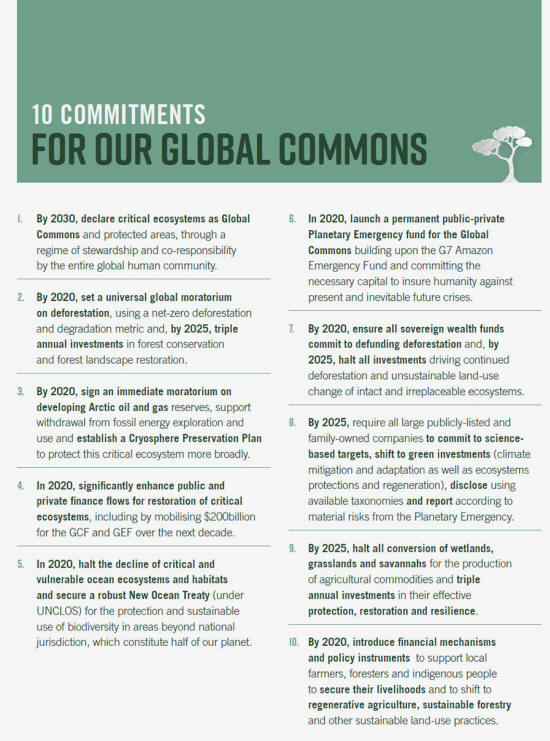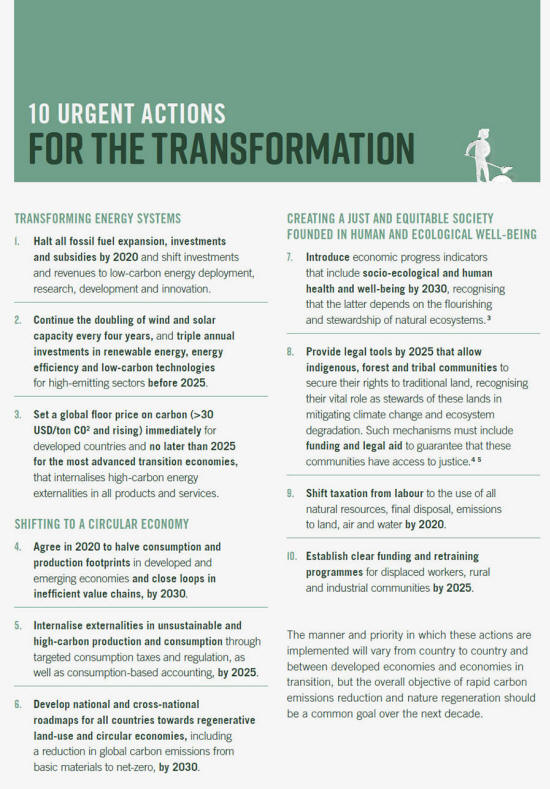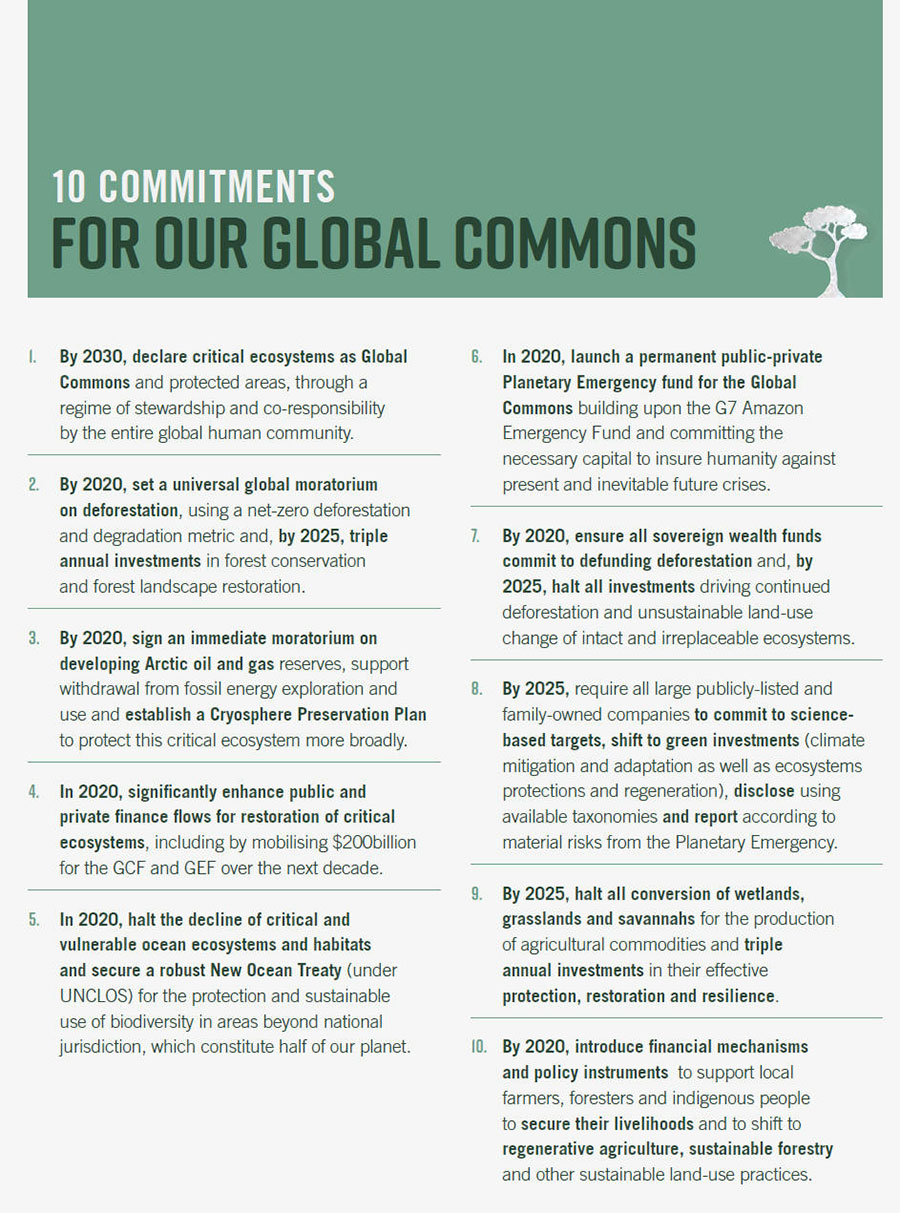For 10,000 years, human civilization has grown and thrived because
of Earth's remarkable climate stability and rich biological
diversity.
In the last 50 years, human activity has severely
undermined this resilience.
Our patterns of economic
growth, development, production and consumption are pushing the
Earth's life-support systems beyond their natural boundaries. The
stability of these systems - our global commons on which we so
fundamentally depend - is now at risk.
The science is clear that we
are now accelerating towards tipping points and that the
consequences of inaction will be catastrophic for humanity.
The time
to act is running out...
This is a Planetary Emergency. The definition of an
'emergency' is a
dangerous event requiring immediate action to reduce risk of
potentially catastrophic results.
The impacts of
climate change and
ecological destruction are more severe and are manifesting
themselves earlier than many scientific predictions in previous
decades had foreseen. The most authoritative global scientific
assessments conclude that without major interventions, the risks
will soon reach a critical stage.
We need to stabilize the climate
at 1.5°C above pre-industrial temperatures, halt the loss of
biodiversity, slow polar ice sheet melt and glacier retreat, protect
critical biomes and store more carbon in soils, forests and oceans.
This is how we will
guarantee the long-term health and well-being of
both people and planet.
To do that, however, our response to this
complex emergency must reflect the intricate links between life on
our planet and the systems that regulate it.
It must address the
convergence of crises and tipping points which have created this
Planetary Emergency. We have no more time for incremental,
siloed
policy action.
2020 is a "Super Year" for international policy action.
It is the
75th anniversary of
the United Nations.
It is the first opportunity
for nations to increase climate ambition and meet 2050 net-zero
goals.
A new treaty on the oceans will be agreed.
Biodiversity
targets will be announced.
And 2020 will mark the beginning of the
decade to scale action to achieve the Sustainable Development Goals.
This decade must be a turning point, the moment when the world bends
the curve, averts the impending disaster and opts instead to embark
on the fastest economic transformation in our history.
Declaring a
Planetary Emergency provides a new compass for nations and injects
the essential urgency into decision-making.
It will ensure that all
action from 2020 will be taken in light of its impact on the
stability of Earth's life-support systems, and be underpinned by the
social and economic transformations needed to secure the long-term
health and well-being of people and planet.
While our efforts should
be global, our responses must be local.
They should be tailored to
local needs, resources and cultures to ensure they have maximum
impact and work to everyone's advantage.
A Decade of
Action - Emerging from 'Emergency'
The existential
risk is 'real.'
Yet, the opportunities to not just
avert disaster but to rebuild, improve and regenerate are readily
available.
History has shown that humanity is remarkably resilient.
We are well adapted to respond to disaster through cooperation and
innovation. But the potential consequences we face this time are
different - we have a narrow window to act now to reduce risk or
avoid catastrophe.
We don't know how to reconstruct,
-
the cryosphere
-
the hydrological cycle
-
the rainforests
-
coral reefs
...and all other
life-support systems on Earth.
Once the emergency fully manifests
itself, it will simply be too late to reverse the breakdown.
As well
as halting climate change and protecting nature, these efforts will
improve health, livelihoods and equity and create more livable and
sustainable cities and rural communities.
Our proposed commitments and underpinning action are of the scale
needed to respond to the emergency facing people and planet.
Our aim
is to protect the Global Commons through 10 clear commitments, and
ensure they are met by immediately implementing a set of
transformational policy and market levers.
This is our insurance
policy to emerge from emergency and guarantee a just transition for
all.


We invite nations to discuss the case for a
Planetary Emergency
Plan.
We propose such a plan be founded on the
urgent need to halve
greenhouse
gas emissions by 2030, to reach carbon-neutrality by
2050, while halting biodiversity loss and protecting essential
Global Commons.
Such an initiative is consistent with the
Sustainable Development Goals to end poverty and improve quality of
life. We can emerge from emergency to a world which benefits all
species, within planetary boundaries and leaving no one behind.
This
is the world we envisage, and the world to which we must all aspire.
The Rationale For Emergency Action
The science is clear:
the climate and biodiversity are fully
integrated and interdependent.
Every year since the Industrial
Revolution, land-based and ocean ecosystems have absorbed close to
half of all emissions from fossil-fuel burning.
Without nature's
ability to absorb and store our
GHG emissions, we would have already
exceeded 2°C
of warming, with potentially disastrous consequences.
Breaching this threshold of warming could push the planet towards
irreversible and catastrophic biosphere feedbacks
When climate change alters a chink in the planetary system, it can
set off a chain of negative feedback loops. Increasing droughts, for
instance, are reducing the ability of tropical forests to store
carbon, making them more prone to fires, releasing yet more GHG
emissions.
The
significant 'loss' of the
Cryosphere has reduced the
albedo capacity of key Earth systems to reflect heat away from the
planet.
The higher the temperature, the more permafrost thaws, with
greater emissions of both CO2 and methane, leading to even greater
warming and triggering further negative feedback loops.
At least
one million species risk disappearance, many within
decades.
Food chains could disintegrate and vital ecosystems
collapse. Species diversity and ecosystems integrity play a
fundamental role in regulating the climate, water cycles, carbon
sequestration and food production.
The increase in costly, extreme weather events around the world is
symptomatic of the increasing instability of our climate system.
Accelerating sea-level rise from polar ice sheets threatens millions
in more intense storms. 'Loss' of mountain glaciers and snowpack
threaten reliable water supplies for billions, from the Indian
sub-continent to the American West.
Fundamental changes to the environment threaten to undermine the
progress we have made in health and life expectancy. More heat
stress, for example, reduces labor productivity and causes more
deaths, particularly in mid- and low-latitude regions.
Fires from
intentional burning in agriculture spread to neighboring farms and
forests, damaging soil carbon capacity and productivity.
Declining
crop yields in tropical and sub-tropical regions will increase under-nutrition for many millions, stunting children's growth.
Land-use changes, pollution and temperature rise are causing more
infectious and mosquito-borne 'diseases'.
Current economic assessments of planetary changes are deeply
concerning and global economic and societal risks of accelerated
planetary pressure are unimaginable. Yet we know that the costs of
action are far less than the cost of inaction.
The tools we need to
respond boldly to the Planetary Emergency are readily available, and
they will reap significant societal and economic benefits.
The IPCC Special Report on 1.5°C (SR 1.5) tells us that remaining at or below
1.5°C remains physically, technically and economically within our
reach if we act at sufficient speed.
Over the next 10 years, we can
steer our development path onto one which benefits all humanity and
allows economies in transition to leapfrog and immediately seize the
opportunities from a
low-carbon, 'well-being' economy...
References
-
https://www.nature.com/articles/461472a
-
IPCC Special
Report on 1.5 Degrees of Global Warming (2018), IPBES
Global Assessment (2019) and IPCC Special Report on
Climate Changen and Land (2019)
-
https://www.thelancet.com/pdfs/journals/lancet/PIIS0140-6736(15)60901-1.pdf
-
https://www.climatechangenews.com/2019/08/08/un-science-report-shows-time-reboot-relationship-nature/
-
https://www.wri.org/blog/2018/09/safeguarding-carbon-stored-indigenous-and-community-lands-essential-meeting-climate
-
https://www.ipcc.ch/sr15/chapter/spm/
-
https://www.ipbes.net/globalassessment-report-biodiversityecosystem-services




